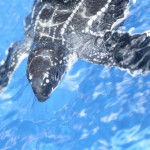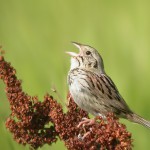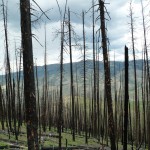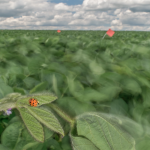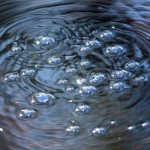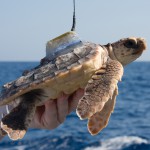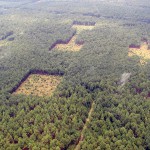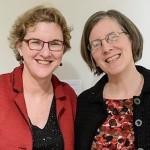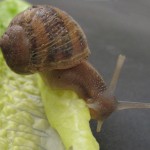Tag Zoology
Plump turtles swim better: First models of swimming animals
For the first time, researchers at the University of Wisconsin–Madison, Florida Atlantic University (FAU), and the National Oceanic and Atmospheric Administration (NOAA) have measured the forces that act on a swimming animal and the energy the animal must expend to move through the water.
Balancing birds and biofuels: Grasslands support more species than cornfields
In Wisconsin, bioenergy is for the birds. Really. In a study published today in the journal PLOS ONE, University of Wisconsin–Madison and Wisconsin Department of Natural Resources (DNR) scientists examined whether corn and perennial grassland fields in southern Wisconsin could provide both biomass for bioenergy production and bountiful bird habitat. The research team found that where there are grasslands, there are birds. Grass-and-wildflower-dominated fields supported more than three times as many bird species as cornfields, including 10 imperiled species found only in the grasslands.
Mountain pine beetles get a bad rap for wildfires, study says
Mountain pine beetles get a bad rap, and understandably so. The grain-of-rice-sized insects are responsible for killing pine trees over tens of millions of acres in the Western U.S. and Canada over the last decade. But contrary to popular belief, these pests may not be to blame for more severe wildfires like those that have recently swept through the region. Instead, according to a new study by UW–Madison zoology professor Monica Turner, weather and topography play a greater role in the ecological severity of fires than these bark-boring beetles.
Dwindling wind may tip predator-prey balance
Bent and tossed by the wind, a field of soybean plants presents a challenge for an Asian lady beetle on the hunt for aphids. But what if the air - and the soybeans - were still?
Baby sea turtles spend ‘lost years’ in warm blankets of seaweed
Nosing their way out of eggs buried in sandy beaches from Florida’s east coast north into the Carolinas, baby loggerhead sea turtles race to the water as fast as their flippers will carry them and begin a swim frenzy to clear the predator-rich shore.
Seed dispersal gets a test in carved-out ‘habitat corridors’
Field ecologists go to great lengths to get data: radio collars and automatic video cameras are only two of their creative techniques for documenting the natural world. So when a group of ecologists set out to see how wind moves seeds through isolated patches of habitat carved into a longleaf pine plantation in South Carolina, they twisted colored yarn to create mock seeds that would drift with the wind much like native seeds.
‘Cabinet of curiosities’ captures nature through work of artists and scientists
Of all the places Sierra Swenson expected to end up during her first semester at college, precious few were lined with jars full of preserved reptiles.
Eavesdropping plants prepare to be attacked
In a world full of hungry predators, prey animals must be constantly vigilant to avoid getting eaten. But plants face a particular challenge when it comes to defending themselves.
A virtual elephant from a marriage of biology, engineering, and art
The solid aluminum cast of an elephant on Warren Porter's desk has been waiting for 25 years.
UW-Madison zoologist elected to prestigious academy
Anthony Ives, Plaenert-Bascom Professor of Zoology at the University of Wisconsin–Madison, has been elected to membership in the prestigious American Academy of Arts and Sciences.
Eleven professors appointed to named professorships
Eleven distinguished faculty members have received named professorships, some of the highest honors for established faculty.
Precipitation, predators may be key in ecological regulation of infectious disease
A little information can go a surprisingly long way when it comes to understanding rodent-borne infectious disease, as shown by a new study led by John Orrock from the University of Wisconsin–Madison.
UW-Madison trio named Leopold Leadership Fellows
Three University of Wisconsin–Madison professors are among only 20 academics from throughout North America chosen this year to participate in a prestigious environmental leadership and communications training program.
Study: Mountain vegetation impacted by climate change
Climate change has had a significant effect on mountain vegetation at low elevations in the past 60 years, according to a study done by the University of California at Davis, the University of Wisconsin–Madison and U.S. Geological Survey.
Invasive shrubs increase spread of tick-borne disease
For a hungry tick, bush honeysuckle is as good as a drive-through.
Report casts world’s rivers in ‘crisis state’
The world's rivers, the single largest renewable water resource for humans and a crucible of aquatic biodiversity, are in a crisis of ominous proportions, according to a new global analysis.
Special symposium addresses practical applications of evolution
The Center of Rapid Evolution (CORE) at the University of Wisconsin–Madison is sponsoring a special event to foster discussion and outreach about how the science of evolution applies to real-world problems.
Curiosities: Why do sharks have to swim constantly?
For two reasons, says James Kitchell, professor of zoology at UW–Madison. First, sharks lack the swim bladder that most fish use to adjust their buoyancy.

